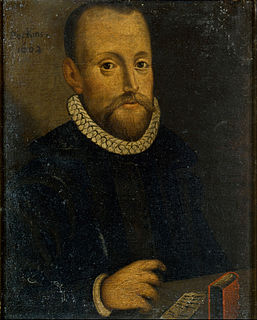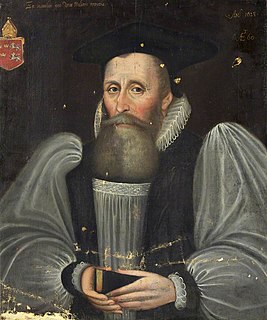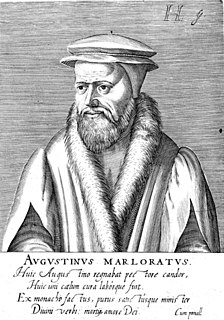
Thomas Morton was an English churchman, bishop of several dioceses. Well-connected and in favour with James I, he was also a significant polemical writer against Roman Catholic views. He rose to become Bishop of Durham, but despite a record of sympathetic treatment of Puritans as a diocesan, and underlying Calvinist beliefs shown in the Gagg controversy, his royalism saw him descend into poverty under the Commonwealth.

William Perkins (1558–1602) was an influential English cleric and Cambridge theologian, receiving both a B.A. and M.A. from the university in 1581 and 1584 respectively, and also one of the foremost leaders of the Puritan movement in the Church of England during the Elizabethan era. Although not entirely accepting of the Church of England's ecclesiastical practices, Perkins conformed to many of the policies and procedures imposed by the Elizabethan Settlement. He did remain, however, sympathetic to the non-conformist puritans and even faced disciplinary action for his support.

Cornelis Jacobszoon Drebbel was a Dutch engineer and inventor. He was the builder of the first navigable submarine in 1620 and an innovator who contributed to the development of measurement and control systems, optics and chemistry.

Gervase Babington (1549/1550–1610) was an English churchman, serving as the Bishop of Llandaff (1591–1594), Bishop of Exeter (1594–1597) and Bishop of Worcester in 1597–1610. He was a member of the Babington family and held influential offices at the same time as his cousin Anthony Babington was executed for treason against Elizabeth I as part of the Babington Plot.
Patrick Anderson (1575–1624) was a Scottish Jesuit, known as a missioner, college head, and author.
Robert Tounson — also seen as “Townson” and “Toulson” — was Dean of Westminster from 1617 to 1620, and later Bishop of Salisbury from 1620 to 1621. He attended Sir Walter Raleigh at his execution, and wrote afterwards of how Raleigh had behaved on that occasion.
John Boys (1571–1625) was Dean of Canterbury from 1619 to 1625.

Nicholas Felton (1556–1626) was an English academic, Bishop of Bristol from 1617 to 1619, and then Bishop of Ely.
Matthew Kellison was an English Roman Catholic theologian and controversialist, and a reforming president of the English College, Douai.
Thomas Sparke (1548–1616) was an English clergyman, who represented the Puritan point of view both at the 1584 Lambeth Conference and the 1604 Hampton Court Conference.

Alexander Neville (1544–1614) was an English scholar, known as a historian and translator and a Member of the House of Commons.
Thomas Drant (c.1540–1578) was an English clergyman and poet. Work of his on prosody was known to Sir Philip Sidney and Edmund Spenser. He was in the intellectual court circle known as the 'Areopagus', and including, as well as Sidney, Edward Dyer, Gabriel Harvey, and Daniel Rogers. He translated Horace into English, taking a free line in consideration of the Roman poet's secular status; but he mentioned he found Horace harder than Homer. Drant's translation was the first complete one of the Satires in English, in fourteeners, but makes some radical changes of content.
Meredith Hanmer (1543–1604) was a Welsh clergyman, known as a controversialist, historian, and translator. He was considered embittered, by the Lord-Deputy William Russell, 1st Baron Russell of Thornhaugh; but he appears now as a shrewd observer of the Protestant and nonconformist life of Ireland as founded around Trinity College, Dublin.

Robert Hill was an English clergyman, a conforming Puritan according to Anthony Milton.

William Nicholson was an English clergyman, a member of the Westminster Assembly and Bishop of Gloucester.
John Sandford or Sanford was an English clergyman and academic, known as a grammarian of the Romance languages. He was also a neo-Latin poet, and a founder of the tradition of literary nonsense under the pseudonym Glareanus Vadianus, a mocker of Thomas Coryat.
Sebastian Benefield was an English clergyman and academic.
Lancelot Ridley, was an English clergyman, known as a theological writer, and rector of St James' Church, Stretham, Cambridgeshire.
John Healey was an English translator. Among scanty biographical facts, he was ill, according to a statement of his friend the printer Thomas Thorpe, in 1609, and was dead in the following year.
William Crashaw or Butt (1572–1626) was an English cleric, academic, and poet.
















